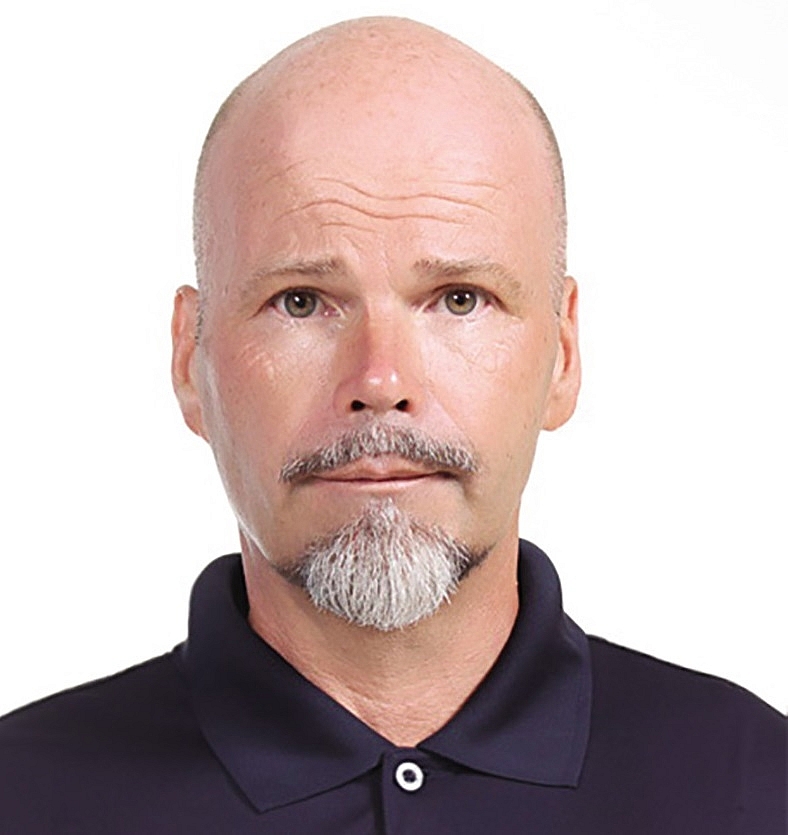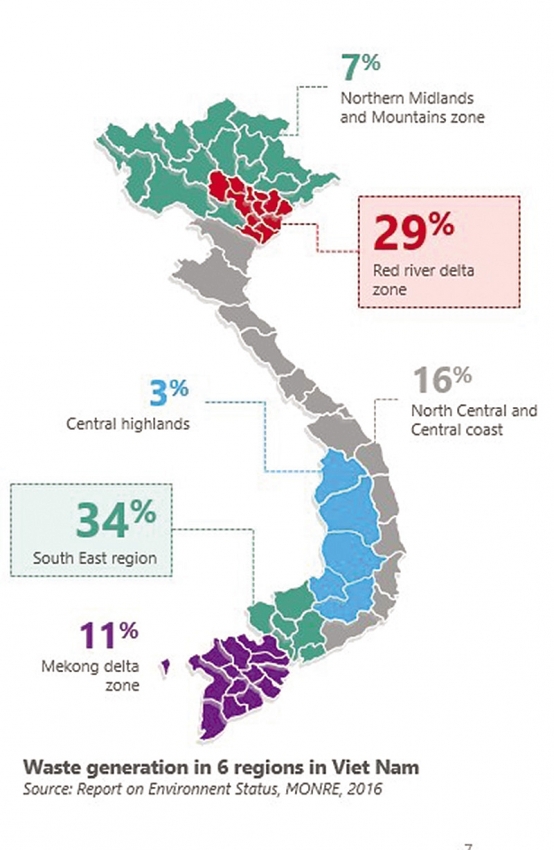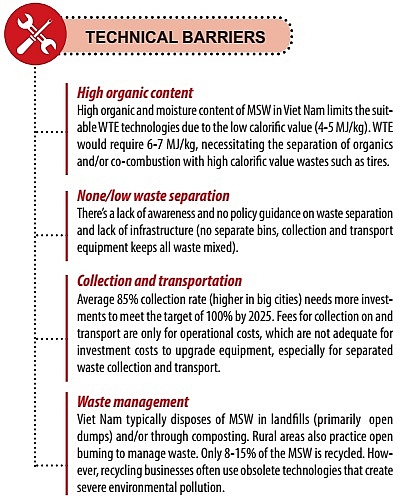Assembling a circular economy
 |
The Waste to Wealth 2015 benchmark report by Ireland’s Accenture, a multinational professional services firm providing services and solutions in strategy, consulting, and digital technology, identified five business models that will drive the circular economy. The report estimated that the circular economy could generate up to $4.5 trillion of additional global economic output by 2030.
Specifically, recovery and recycling save costs and reduce the volume of waste and landfill. Circular supply chains allow suppliers and partners to use recycled materials repeatedly, saving costs and bringing predictability to supply chains. For example, a clothing company can use new materials to avoid the environmental damage and risks associated with cotton cultivation.
Besides, sharing platforms use digital technologies to maximise the use of underused assets, such as hotel rooms, vehicles, or consumer goods. Products-as-a-service replace ownership-based models with usage-based services, such as selling driving time instead of selling cars. Moreover, product life extension relies on remanufacturing and repairing used products to give them a longer life with existing or new customers.
Most of the new activities in the circular economy in Vietnam have emerged in the recovery and recycling of municipal solid waste (MSW) sub-segment. Shifting away from current waste disposal practices to more sustainable approaches, such as energy recovery through, for example large-scale waste-to-energy facilities that systematically treat waste as a resource, are embedded in several strategies, as well as provide opportunities for Vietnam to achieve its commitments in the United Nations Sustainable Development Goals, the Paris Agreement, and Nationally Determined Contributions, which are at the heart of the Paris Agreement and embody efforts by each country to reduce national greenhouse gas (GHG) emissions and adapt to the impacts of climate change.
 |
Mitigating the risks
In order to attract foreign direct investment and the best available waste management technologies to Vietnam’s MSW segment, the whole waste management value chain from collection and treatment to offtake must be bankable, meaning the long-term purchasing agreements of raw materials and the robust offtake agreements of process outputs must be in place. The waste management business is a long-term utility business and thus these agreements establish highly visible long-term operating environment for the waste operators.
The contractual risks related to the waste value chain are the most typical obstacles in the waste management in Southeast Asia, not only in Vietnam. There are several factors contributing such as a resistance or business-as-usual attitude of the current operators in the waste management to apply new technologies, grow green, and form more advanced partnerships models. The risk mitigation methods differ, as the problems are often very local. The transparent auctioning of new waste management rights, for example in Thailand, has boosted the market development in the recent years.
With regards to responsibilities and authorities for MSW management in Vietnam, based on the government’s Decree No.38/2015/ND-CP on the management of waste and discarded materials, the Ministry of Natural Resources and Environment (MoNRE) is in charge of MSW management. At the local level, MSW management, including waste collection and treatment, is under the responsibility of the provincial and municipal people’s committee, specifically the provincial department of natural resources and environment and the department of construction.
 |
Bankable arrangements required
The MoNRE estimates that the MSW generated is around 68,000 tonnes per day with an average collection rate of 85 per cent in the urban areas and 40-55 per cent in the rural areas. Investors find it generally hard to access raw materials, meaning waste collection and thus securing a steady access to waste is one of the key barriers to form back-to-back bankable waste-to-energy or waste-to-fuel projects in Vietnam. In the urban areas, the collection and transportation of MSW are carried out quite properly. This service is provided mainly by public services companies such as urban environment companies, while the remaining is done by micro-entrepreneurs that often work in co-operatives. They are workers who, due to the lack of protective equipment, are exposed to a variety of health risks. Moreover, the transport of waste in open trailers in the middle of city traffic is not safe for the environment.
In Vietnam, MSW is generally disposed in landfills. At present, 76-82 per cent of collected waste is landfilled. There are about 450 operating landfills in Vietnam, of which 80-85 per cent are unsanitary (no gas recovery, no waste water treatment). The waste sector represents 7 per cent of Vietnam’s national GHG emissions, according to the 2017 Biennial Update Report 2 of the United Nations Framework Convention on Climate Change. Vietnam is in a situation in which it has to address how to reduce the accumulation of waste in landfills and find out what to do with the current waste. According to the Vietnamese government’s development plan, discharges must be reduced by 80 per cent by 2025.
Although the potential of solar and wind energy is much higher than MSW to energy in Vietnam, the government encourages the development of power generation projects using MSW. Waste-to-energy projects produce several benefits. Such projects help in generating energy, in the processing of waste, and in minimising environmental pollution, which has grown exponentially in urban Vietnam.
What the stars mean:
★ Poor ★ ★ Promising ★★★ Good ★★★★ Very good ★★★★★ Exceptional
Themes: Towards Sustainability
- $100 million initiative launched to protect forests and boost rural incomes
- Decree opens incentives for green urban development
- European expertise to boost Vietnam’s sustainable logistics push
- Living with water: from policy to practice of the 'sponge cities' concept
- From climate pressure to new urban mindsets
Related Contents
Latest News
More News
- $100 million initiative launched to protect forests and boost rural incomes (January 30, 2026 | 15:18)
- ASEAN could scale up sustainable aviation fuel by 2050 (January 24, 2026 | 10:19)
- 64,000 hectares of sea allocated for offshore wind surveys (January 22, 2026 | 20:23)
- EVN secures financing for Quang Trach II LNG power plant (January 17, 2026 | 15:55)
- PC1 teams up with DENZAI on regional wind projects (January 16, 2026 | 21:18)
- Innovation and ESG practices drive green transition in the digital era (January 16, 2026 | 16:51)
- Bac Ai hydropower works stay on track despite holiday period (January 16, 2026 | 16:19)
- Fugro extends MoU with PTSC G&S to support offshore wind growth (January 14, 2026 | 15:59)
- Pacifico Energy starts commercial operations at Sunpro Wind Farm in Mekong Delta (January 12, 2026 | 14:01)
- Honda launches electric two-wheeler, expands charging infrastructure (January 12, 2026 | 14:00)

 Tag:
Tag:



















 Mobile Version
Mobile Version